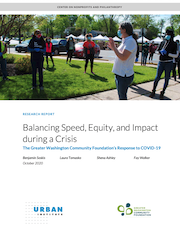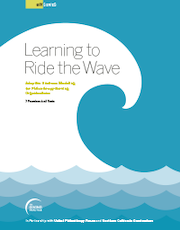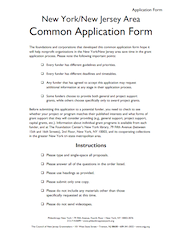Site Search
- resource provided by the Forum Network Knowledgebase.
Search Tip: Search with " " to find exact matches.
This self-assessment/reflection tool is intended for foundations and funders committed to or interested in Doing Good Better. Doing Good Better is inspired by, and builds on, years of nonprofit and community advocacy, the principles of “Trust Based Philanthropy,” and numerous other resources. We hope this tool will open up the opportunity for dialogue and reflection with your board, staff and funded agencies. Your response can serve as a baseline for future measurement of your organization’s progress towards Doing Good Better, stronger philanthropic/nonprofit partnerships, and heightened community impact.
This assessment is intended as a self-reflection tool, rather than a recommendation for any specific policy within a particular funding institution. It has four sections, one for each Doing Good Better goal. For most funders, a single individual in grantmaking or senior leadership will be able to complete the full assessment; others may need additional support from other departments to respond. While filling out the assessment, we encourage you to consider how self-reporting bias may show up in your answers. Also, notice where a question challenges you and get curious about why.
To make the most of this tool, we recommend that you first review and consider the Doing Good Better goals before starting this assessment. We also encourage your board and staff to go through the goals as you reflect on your responses.
• Goal 1: Center Equity
• Goal 2: Provide Flexible Funding
• Goal 3: Provide Reliable Funding
• Goal 4: Reduce Paperwork Burden
DOWNLOAD THE SELF-ASSESSMENT TOOL

Steering Committee
Jorge Cruz, Executive Director, LISC Greater Newark
Linda Czipo, President & CEO of the New Jersey Center of Nonprofits
Jackie Edwards, Executive Director, Parents Inc of NJ
Victoria Fernandez, Director of Thriving Communities, Grunin Foundation; and Co-Founder, Nonprofit Professionals of Color Collective
Tyneisha Gibbs, Founder and Principal Consultant of 144th & Vine; and Co-Founder, Nonprofit Professionals of Color Collective
Theresa Jacks, President and CEO, Council of New Jersey Grantmakers
Bridget Phifer, Chief Executive Officer, Parkside Business & Community in Partnership
Rosalía Velázquez, Director of Strategic Partnerships, New Jersey Center of Nonprofits
Advisory Group
Keith R. Adams, Executive Director, NJVOAD
Carin Berkowitz, Executive Director, New Jersey Council for the Humanities
Elsa Candelario, Professor of Professional Practice, Latino/a/x Initiatives for Service, Training, and Assessment, Rutgers School of Social Work
Jane Cohen, Executive Director, Governor’s Office of Climate Action and the Green Economy
René O. Deida, Director, Corporate and Community Engagement, Prudential Financial, Inc.
Hans Dekker, President, Community Foundation of New Jersey
Craig Drinkard, Co-Executive Officer, Victoria Foundation
Bill Engel President, The Union Foundation
Andy Fraizer Executive Director, Community Foundation of South Jersey
Laurie Goganzer, President and CEO, YMCA of Greater Monmouth County
Jeremy Grunin, President, Grunin Foundation
Bob Guarasci, Founder & CEO, New Jersey Community Development Corporation
Susan Hoskins, Executive Director, Friends Foundation for the Aging
Sharnita C. Johnson, Vice President of Strategy, Impact and Communication, Victoria Foundation
Elaine E. Katz, Sr. Vice President, Kessler Foundation
Eddie LaPorte, Director, New Jersey Office of Faith Based Initiatives
Taneshia Nash Laird, President and CEO, Newark Symphony Hall
Tammy Rice Herman, Director of Grants & Strategies, New Jersey State Council on the Arts
John Thurber, Partner, Br'Island Group
Keith Timko, Executive Director & CEO, Support Center
Sandra Toussaint, President & CEO, United Way of Greater Mercer County
Allison Tratner, Executive Director, New Jersey State Council on the Arts
Mark Valli, CEO, NORWESCAP
Margaret Waldock, Executive Director, Duke Farms
Catherine Wilson, President & CEO, United Way of Greater Newark
Doing Good Better, a partnership of the Council of New Jersey Grantmakers and the New Jersey Center for Nonprofits, is a community of funders and nonprofits taking action against the power imbalances and racial inequities in philanthropy, nonprofits, and government.
To answer the basic question of how many active family foundations are planning to spend down or exist in perpetuity (or have not yet made a decision), and to examine foundations’ motivations and decision-making, the Foundation Center, in collaboration with the Council on Foundations and with additional assistance from the Association of Small Foundations, launched a study of family foundations in 2008. This report presents the full range of study findings, which are based on survey responses from 1,074 family foundations.

The COVID-19 public health and economic crisis has changed our world as we know it. As employers moved to remote work, schools shifted to distance learning, and businesses closed completely, it became clear that the impact on residents, nonprofits, and businesses was far greater than anyone could have ever imagined.
In response to the growing and evolving needs of our region, the Greater Washington Community Foundation established the COVID-19 Emergency Response Fund to raise and rapidly deploy funding to local nonprofits providing food, shelter, educational supports, and other critical services.
From the beginning our goal was clear: to address the immediate needs and reach adversely affected communities, particularly low-income households and communities of color. We know all too well that in a crisis like this, these marginalized communities are hit the hardest, and often take the longest to recover.
In times of crises, The Community Foundation is our region’s philanthropic first responder, bringing together individuals and families, philanthropic peers, corporate partners, and local government advisors to address community issues. Building on our rich history of emergency response work, we grounded our COVID-19 response efforts in a similar coordinated approach.
This report chronicles the steps taken, under immense pressure, to develop a coordinated emergency response effort to support a broad range of needs across the region. Once again this effort has demonstrated that working in partnership and close collaboration with our philanthropic peers and local government advisors is an effective way to manage a response to both urgent and longer-term needs.

Developed in partnership with United Philanthropy Forum and Northern California Grantmakers, this guide shares seven practices and 12 tools for Philanthropy-Serving Organizations who seek effective ways to mobilize resources to sustain their organization’s work. The guide features perspectives from dozens of leaders of national and regional PSOs and examples from our work with these organizations. Much of the content is based on conversations and strategy work with PSO leaders, staff and board members.
Foundations Facilitate Diversity, Equity, and Inclusion: Partnering with Community and Nonprofits, a new report by the OMG Center for Collaborative Learning, confirms that foundations can, in fact, facilitate diversity, equity, and inclusion (DEI) through their grantmaking processes and their partnerships with nonprofits—and identifies eight specific practices for foundations to emulate.
The report takes a deep dive into the work of nine foundations that represent a diverse cross-section of types and sizes, and offers useful lessons about how foundations can better partner with nonprofits to be more effective in their work.

